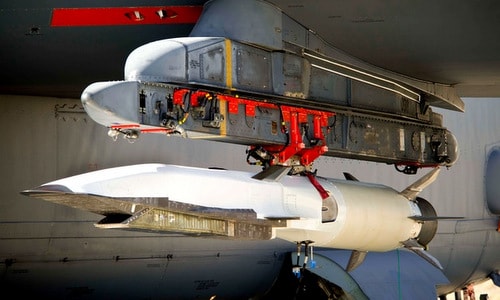The risk of nuclear war from hypersonic weapons.
Hypersonic weapons could trigger war between two nuclear powers because the parties involved would have very little time to react to the situation.
Hypersonic weapons typically travel at speeds exceeding 6,175 km/h. Graphic: National Interest. |
The RAND Institute has just issued a warning.development of tHypersonic missiles, high-tech weapons that fly at supersonic speeds, would give major powers almost no time to assess the situation and could inadvertently lead to nuclear war, according to...Popular Mechanics.
Report154 pages longThe article, titled "Non-Proliferation of Hypersonic Missiles - Preventing the Spread of New Weapons," warns of the dangers posed by this type of weapon being developed by Russia, the US, and China. This technology is showing signs of spreading to Europe, Japan, Australia, and India, while other countries are also beginning to express interest.
Hypersonic weapons are designed to penetrate any air defense system and ballistic missile shield thanks to their ability to cruise at speeds exceeding 6,175 km/h, equivalent to more than five times the speed of sound. This capability could force governments around the world to keep their strategic forces, including nuclear weapons, on high alert.
The RAND report states that hypersonic missiles, specifically hypersonic glide vehicles and hypersonic cruise missiles, pose a new threat because they can combine high maneuverability with speeds exceeding 5,000 km/h. This leaves a nation with very little time to respond to an attack. Hypersonic weapons offer a significant deterrent capability to any country that possesses them.
Hypersonic weapons typically use straight-flow jet engines (scramjets) or specialized propulsion systems to achieve speeds exceeding 6,200 km/h. Their flight paths fall below the effective interception range of most ballistic missile defense systems, but exceed the range of traditional air defense systems, making them very difficult to intercept.
 |
The American X-51 Waverider hypersonic vehicle. Photo: USAF. |
Experts at RAND presented a hypothetical scenario in which two countries, India and Pakistan, both possess hypersonic weapons with nuclear warheads deployed in their respective capitals. A hypersonic missile launched from Islamabad, Pakistan, would take only 6 minutes to reach New Delhi, India.
In this case, India had only six minutes to determine whether it was a real nuclear attack and to formulate a response before the missiles hit their targets. The extremely short response time forced New Delhi to retaliate without knowing whether Islamabad's launch was intentional or merely a technical malfunction. The US, Russia, and China could all face similar problems.
Hypersonic weapon technology has emerged and is undergoing testing, but it is not too late for superpowers like the US, Russia, and China to cooperate and agree on principles of non-proliferation of this type of weapon, averting the risk of future nuclear war between nations, RAND experts recommend.
According to VNE
| RELATED NEWS |
|---|



